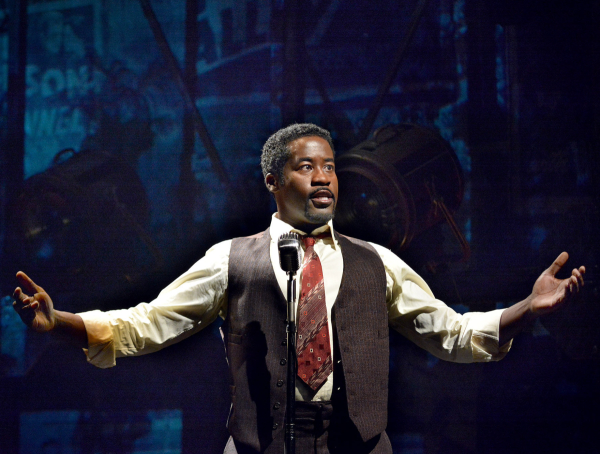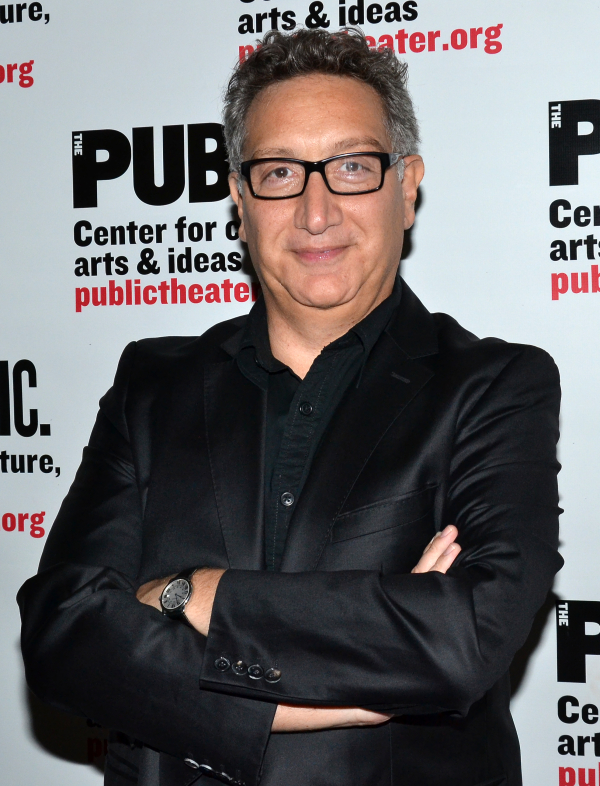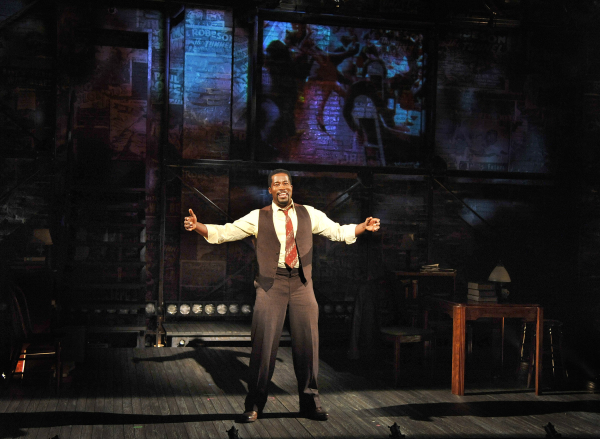Daniel Beaty and Moisés Kaufman Discover Paul Robeson in The Tallest Tree in the Forest
The playwright of ”Through the Night” and the director of ”I Am My Own Wife” collaborate to reintroduce the world to this important figure.
"Paul Robeson was the most famous black man in the world for twenty years," the director Moisés Kaufman begins, "And then, with the House Un-American Activities Committee, he was literally silenced and erased from history."
In theater circles, Robeson was known for his still-legendary performance of the song "Ol' Man River" in Show Boat, which he sang in London (1928), on Broadway (1932), and on film (1936). But Robeson, whose diverse roster of credits also included Shakespeare's Othello and the Eugene O'Neill dramas The Emperor Jones and All God's Chillun Got Wings, was far more than just an entertainer. In The Tallest Tree in the Forest, playwright Daniel Beaty (Through the Night) gives voices to the lesser-known side of Robeson, the son of a slave, who was also an athlete, scholar, attorney, and one of his generation's major civil rights and social activists, and whose career effectively ended when the United States government blacklisted him.
The solo production plays Brooklyn Academy of Music March 22-29 after regional runs at La Jolla Playhouse, Kansas City Repertory Theatre, and Arena Stage. In a recent interview with TheaterMania, the pair discussed what it takes to bring such a multifaceted man back to life.

(© Don Ipock)
What was it that drew you both to the story of Paul Robeson?
Daniel Beaty: I've long been interested in him largely because of his negotiation of his artist self versus his activist self [and] how profoundly he stepped into that arena. Those worlds are ones that I try to negotiate myself. He spoke so clearly in his time to the same issues we're dealing with now. His using this platform of celebrity to speak boldly and to mobilize people has resonances in our time.
Moisés Kaufman: When you are the most famous black man in the world, when you pick up the microphone and one hundred and forty million people listen to your broadcasts, how do you not speak? When Daniel put the story in those terms, I was very taken with that question. [Robeson] was using his concert platform to speak about lynching and British colonial powers in Africa, and people were yelling at him "shut up and sing."…But he felt a responsibility to say what he had seen.
When working on a solo piece about a real-life figure, where do you even begin in terms of research? How closely did you two collaborate?
Daniel: Moisés and I have collaborated deeply on this piece. We've read close to every book out there, watched documentaries…Because his life is so massive, a big part of the work of this play has been not only clarifying the journey, but clarifying which events help make the journey as specific and compelling as possible. I've done more rewrites on this play than I've done of everything. I've probably written three plays, and we have one that will be on the stage.
Moisés : You can write a play about Robeson as a black performer. You can write a play about Robeson as the man who fought against the English colonizing Africa. He was as interested in the problems of the Africans in Kenya as he was interested in the hunger of the Welsh miners who were underpaid. This is a man who went to Kenya, Ireland, Russia, and met Stalin, and understood what the different political thoughts and tendencies were around the world.

(© David Gordon)
As artists, who blend the creative and political, do you see Robeson as a kindred spirit?
Moisés: Whether it's Through the Night or Emergency [by Beaty], or Laramie Project or Gross Indecency [by Kaufman], we are artists who are interested in that space where art can have a strong social commentary. Robeson was very happy handling that until he realized it was impossible, that he couldn't do both. He had to commit to one or the other because they were in direct opposition. And I think that Daniel and I fear having to make that decision.
Daniel: It's always a dance. In the work itself, with sufficient rigor and the right collaborators, I think it can hold both. Where I find the challenge is actually a line that Robeson made the decision to cross fully. In the presence of issues feeling urgent and core to your values, what do you do in the moment when you feel your art isn't a sufficient platform for the change you want to see in the world? I relate to it deeply. I've got my foot in each…That evolved after traveling the country for a decade and wanting the work itself to have a certain kind of impact, and realizing that people could be inspired by it, but that there are systems and ways of organizing that allow people to move from inspiration to impact in a different kind of way.
Daniel, do you feel the burden of responsibility on your shoulders in telling Robeson's story?
Oh, huge. For lots of reasons. One, he was destroyed. There is a group of people who are elders, some of whom I'm connected with, all of whom I respect, that knew him personally, for whom he was, is a hero. So [there is] the responsibility to tell his story so that he lives on, while at the same time, hold some of the complexity and vastness of who he was. He was not a simple man. He was not perfect. No one is. And so, it's trying to honor him, while at the same time, doing him justice.

(© Don Ipock)








